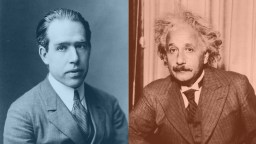Einstein had three great character traits. “I might not be more skilled than other scientists,” he liked to say, “but I have the persistence of a mule.” If he built a house of cards and it came crashing down, young Einstein would exhale and start again, says biographer David Bodanis. He languished for many years in a patent office in Switzerland, unable to get a job as a high-school teacher, while in the top drawer of his desk were four recently completed papers – two of which were Special Relativity and E=mc2. He pressed on with his work until people noticed. Secondly, Einstein had a thick skin. One bad whisper can shatter most mere mortals, but in 1920 there was an anti-Einstein rally at the Opera House in Berlin, where people opposed to “Jewish science”. Later still, in 1933, highly educated students from Göttingen, one of the greatest university in the world at the time, burned his books. Thirdly, he was inherently noble. He had a great conscience for his fellow humans, and used a huge amount of his income and other raised money to get people out of Germany and safely to America. Despite having thick skin, he was not callous – he had great sensitivity for humanity as a whole. Though the FBI did not let him be part of the team that built the atom bomb, Einstein’s work paved the way for the technology. When he heard the U.S. had dropped the bomb on Japan, he was grief stricken, and said “If I had known I wouldn’t have lifted a finger.” David Bodanis’ most recent book is Einstein’s Greatest Mistake.
David Bodanis’ most recent book is Einstein’s Greatest Mistake.
David Bodanis: 1905 Albert Einstein's mother thought he was a genius; his sister thought he was a genius; his father thought he was a genius, but he was stuck in the patent office in Bern Switzerland and nobody else thought he was a genius at all. We had mouthed off to his professor at his university. He didn't get any good job. His department of theoretical physics was the top drawer of his desk and he would slam it close. And he had tried all sorts of things. He was about 25/26, we had tried lots of ideas while he was stuck at the patent office. Nothing had really come together. And then suddenly in the spring of 1905 it was like a storm burst in his head. He poured out one of paper after another about four of them were worthy of the Nobel Prize. And the final two were Special Relativity and E=mc2.
Einstein once said he wasn't smarter than other people but he said I have the persistence of a mule. And he was really honest about it. When he was a little kid and he made card castles he'd make layer after layer after layer of card castles and if they blew down well he'd take a deep breath and build it up again. So he knew he wanted to understand how the universe worked. He'd always thought the universe was like a series of books waiting on a shelf that if we were really lucky we could take them down and look inside and there would be all the truths of the universe inside there. It might be the Sermon on the Mount for Matthew, it might be what he later discovered things like E=mc2, and most of the time we couldn't look in those books, but occasional he we could and that's what drove him. All through his early 20s he was happily married at the beginning to a really hot young Serbian physics students the only woman in his class and Polytech in Zürich And they had great dreams of maybe becoming professors together, but reality got in the way. He was stuck at the patent office and until 1905 when he was 25/26, he couldn't get any fresh ideas and he and his wife they begin slowly to drift apart. They didn't have money for childcare. She was stuck at home taking care of the kids. She couldn't really participate in his work.
In 1905 he did have this epiphany or or series of epiphanies. He had great, great achievements and he thought he was home clear, but nothing happened. The great professors in Germany one or two of them monitored his work but he couldn't get a job. He applied at one point to teach in a high school in Switzerland and he submitted as a justification for teaching science in high school the theory of relativity E=mc2 and a few other things like that. He was rejected. This was Switzerland. He hadn't done the proper forms. They weren't properly typed and he stayed in the patent office.
Some people take offense very easily. They get a little negative look and they think oh well people don't like to me. Einstein was not like that and he had good reason to think that people didn't like him. In 1920 in Germany the opera house in Berlin was taken over by an anti-Einstein rally. There was swastikas in the front row. This wasn't Arian science, this was Jewish science, it had to be wrong. And then horribly in 1933 his books were burned on the streets in Germany and they weren't just burned by uneducated mobs in the middle of nowhere, the greatest university the world had known was Gertingen in Germany at the time and the students there, the students were so caught up in what was happening that they dragged Einstein's books and books of other people and they burned them in huge piles right in the center in Berlin, in Gertingen and in other places. Luckily by then Einstein was out of the country. Some of the major newspapers and magazines were charging him with they said they had to kill him. It's a variation they didn't just say lock him up, they said the next stage. You start with one stage you go to the next. Because he was famous he managed to get to America. He lived safely in Princeton New Jersey after that. But he was also a noble man and he realized he had to save a lot of people. So he used a huge amount of his income and other funds that he raised to get people who were in danger of death out of harm's way into the safety of America. And there's some lessons for us today.
So after the first world war were vast numbers of people had died and machine gunned for no purpose in Western Europe and, of course, even huge battles also in Eastern Europe, a great number of people thought what could be worth it? What could be worth sending millions of young men rushing into machine guns which are firing our way and killing them? So Einstein thought no war is going to be worth it. Well, in the late 1930s with the rise of Hitler he changed his mind. He thought this is different. This could actually destroy all civilization so he didn't like it but he says yeah we have to defend ourselves; we have to stop this terrible thing. He himself was not allowed to work on the atomic bomb. The FBI thought he was a security risk, in fact he wasn't a security risk but the FBI, as usual, was being very, very cautious. Also much of the atomic bomb, although intellectually owes the ideas to Einstein, a lot of it was practical engineering and he wasn't an engineer. He was good with his hands and building things but he wasn't a practical engineer. So he actually wasn't involved in the building of the bomb. And then in 1945 about a day after it was dropped on her Hiroshima when the news finally reached America he was on holiday in Eastern Long Island. He liked boating. His secretary Helen Dukas woke him up she said, "Professor, there's this terrible news." She told him what had happened then he woke up and he said to her, "If I had known I wouldn't have lifted a finger."






